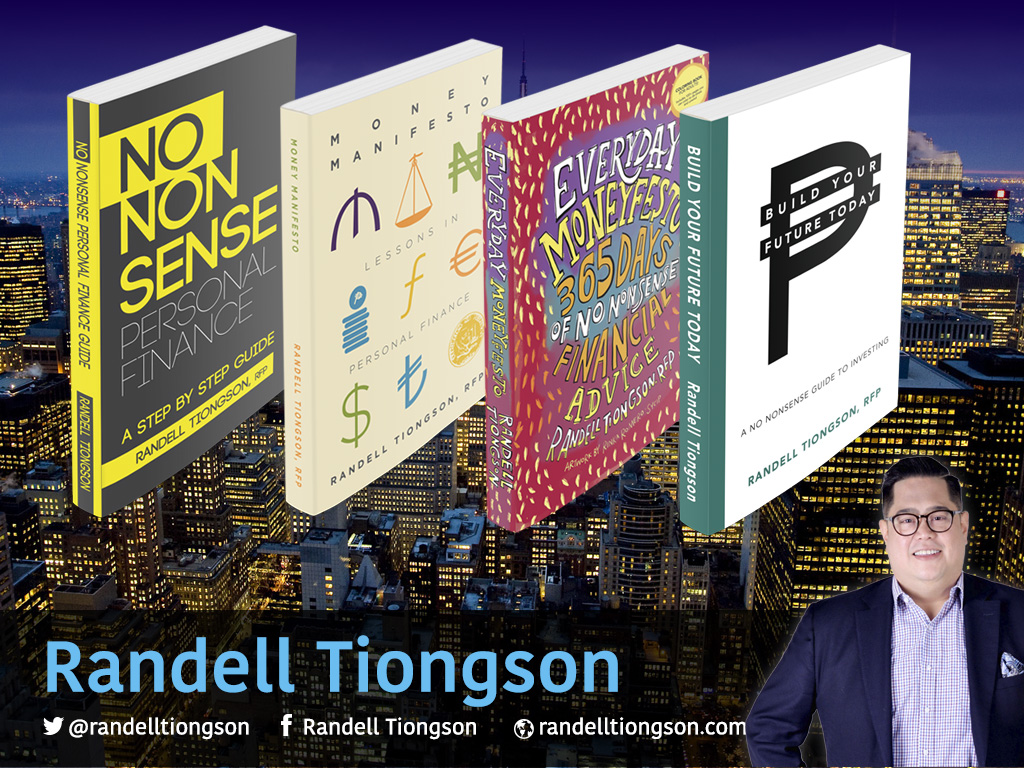Best investments for retirement
By Randell Tiongson on November 3rd, 2016Question: Hi Randell! Good morning! After browsing the net for Filipino personal finance tips, I learned about you. And after reading your articles, I’m very much driven to start investing. I’m already in my 30s and wishing I started earlier. But I can’t dwell on that anymore, so I’m ready to start now. As you keep saying, “the best time to invest was Tuesday, the next best time to invest is today.” With that, I know I should start investing, but where? With the multiple investments available, I don’t know where to start. It’d be great if you could help me on this. Thank you very much and God bless! —Carlo via Facebook
Answer: Hi Carlo! Thank you for messaging me. I’m sharing your query here in my column because I’m sure many Filipinos can relate to your situation. Many hold off saving for retirement because of the mentality that there are still many years left to save, but as you learned, the best time to invest was Tuesday, and the next best time is now. Don’t wait until you’re nearing retirement because investments are meant to be long-term. With that in mind, now we know that we should go for investment vehicles that are more for the long term. So what are these investments?
Property
Real estate is probably the favorite investment of Filipinos. While less than 1 percent of the Philippine population invests in stocks, bonds, and mutual funds, 7 in 10 Filipinos own their homes, according to the Bangko Sentral ng Pilipinas’ (BSP) 2012 Consumer Finance Survey.
Real estate is an advisable investment for retirement because the value of property appreciates through the years. Real estate property isn’t like a time deposit which gives you interest after a year (or less). You won’t make much by selling your property just after 6 or 12 months.
Stocks
Another investment vehicle is stock investing. Stocks are advisable for the long-term because they are risky. This means that the prices of stocks go up and down over a set time period, and you can lose money. One way to decrease your risk and avoid losses is to hold your stocks for the long-term, which makes stocks perfect for retirement. I recommend people to keep their stocks for a minimum of 10 years.
Seeing as you are in your 30s, you have about another 25 more years before you reach retirement age. That’s 20 years more than my suggested 10 years to spread your risk.
Pooled funds
I purposely put ‘pooled funds’ after ‘stocks’ because they are closely related. If you want to buy stocks of SM, Ayala, or Jollibee, you would have to buy them individually through a stock broker or your online trading platform. With pooled funds, be it a mutual fund or a UITF, you get a group of stocks in one basket or fund. The pooled fund can have SM, Ayala, and Jollibee stocks, depending which equities the fund manager buys. The fund manager does the investing for you.
He picks what stocks go into the pooled fund; all you have to do is make an investment deposit and keep track of your investments once or twice a year. It’s also important to know that there are different kinds of pooled funds, there are funds consisted entirely of stocks, others of bonds, while some funds offer a combination of different securities. For the purpose of retirement, and for Carlo who has about 25 years until retirement, a stock or equity-based pooled fund is best for a retirement which is still far away.
With three investments to choose from, you have a clearer idea of where to put your money for retirement. Now the only thing that’s left is to head to the bank (for UITF pooled funds) or a brokerage firm (for stocks and mutual funds) to fill out your application and open an investment account.
Variable Universal Life Insurance
A VUL is very similar to pooled funds but it has a life insurance component and therefore, there is cost of insurance imbedded in the policy. However, if you are in need of financial protection and also want to prepare for retirement at the same time, a VUL will come in handy.
With four investments to choose from, you have a clearer idea of where to put your money for retirement. Now the only thing that’s left is to head to the bank (for UITF pooled funds), a brokerage firm (for stocks) or a financial adviser (for mutual funds and VUL) to fill out your application and open an investment account.
Always remember that there is no such thing as a best investment. Remember to do your assignment well and do not forget to diversify and the key to a comfortable retirement is to start preparing early.
Read my books for practical finance and investments! Email michael@randelltiongson.com or visit National Bookstores to get my books!





